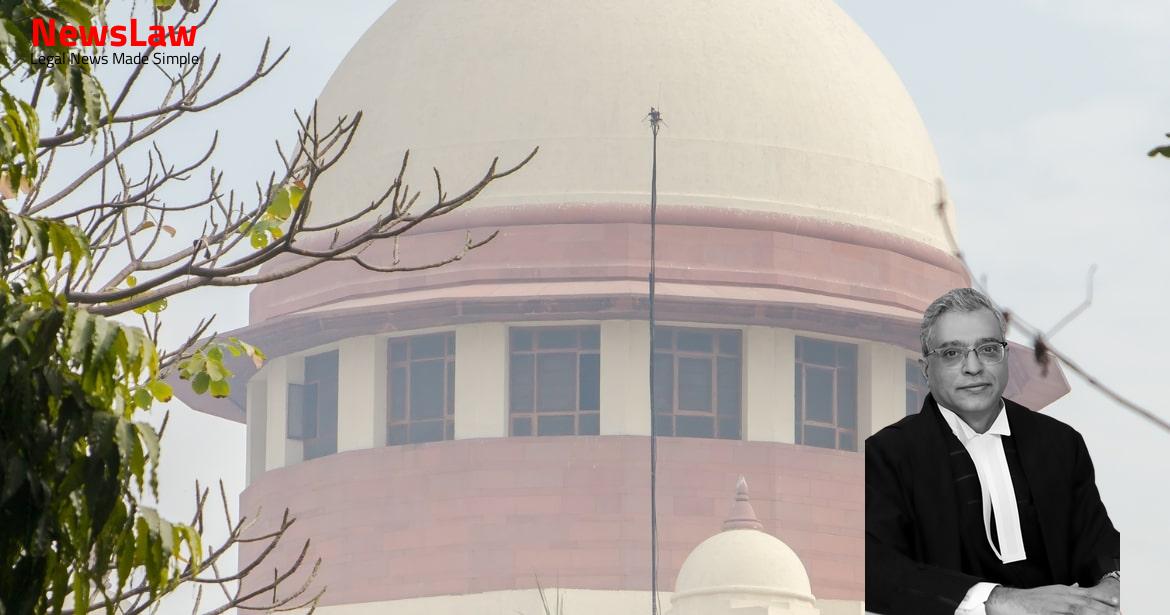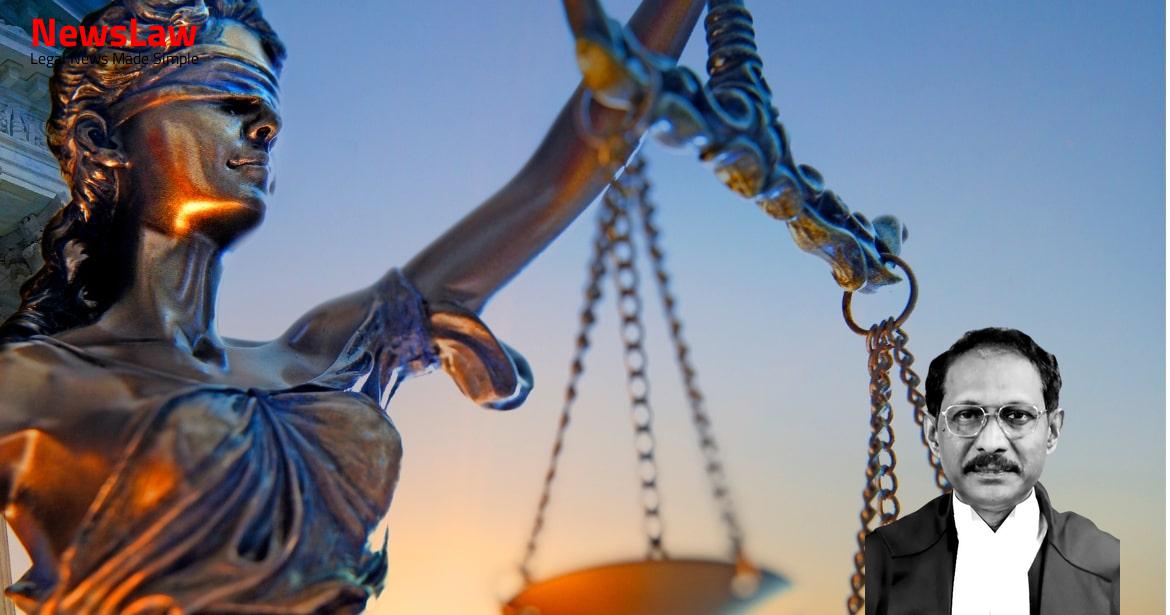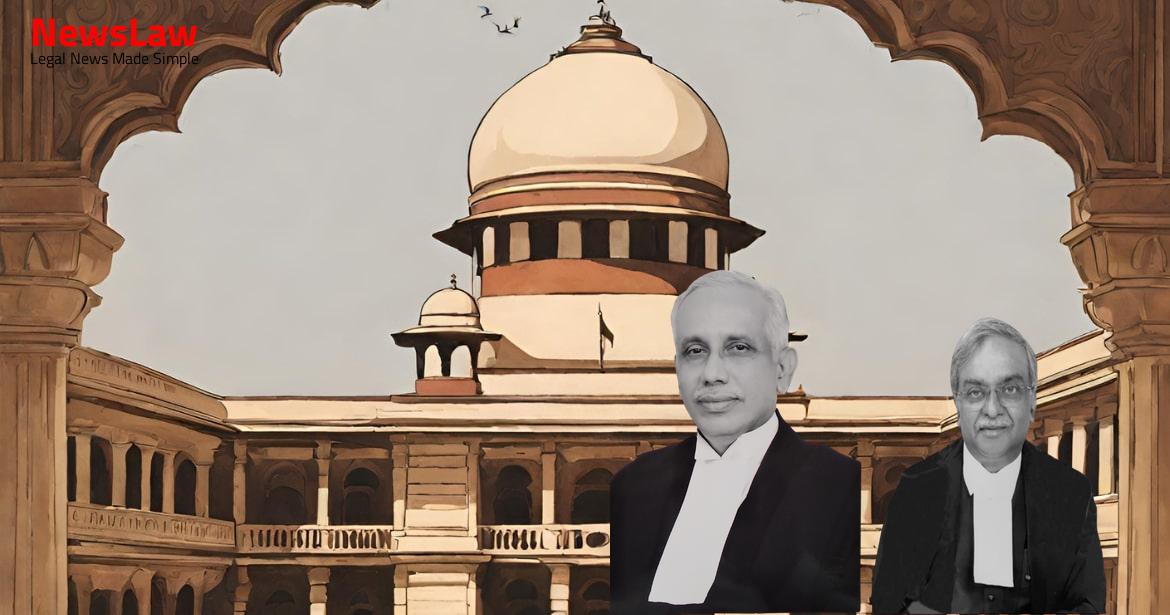Delve into the intricate legal analysis of a recent case focusing on doubts and inconsistencies in witness testimonies. The court’s assessment of evidence and the complexities surrounding witness statements are under scrutiny. Stay tuned to unravel the layers of legal intricacies in this compelling case.
Facts
- High Court rejected the contention that the prosecution case was false and accepted the FIR as genuine and not ante-dated.
- Motive was considered established against A-2 based on the FIR treated as the first dying declaration.
- Despite inconsistencies, key facts were consistent in the testimonies of eye-witnesses PW-1 and PW-6.
- The High Court affirmed the convictions and sentences for all accused without variation.
- Accused were sentenced to life imprisonment for Section 302 read with Section 34 IPC, and rigorous imprisonment for four years for Section 307 read with Section 34 IPC.
- The place of occurrence was accepted as the verandah of the Deceased’s office.
- The contradictions in the witness statements were attributed to intimidation by the accused.
- The High Court disbelieved the second dying declaration of the Deceased, giving preference to the first dying declaration.
- The appeals only pertain to A-1 and A-3 as A-2 had passed away during the appeal process.
- The Deceased lodged an FIR at 8:30 p.m. for the offence under Section 307 of the IPC
- The FIR stated that the three accused, Gullu @ Rajesh (A-1), Vimal Kumar @ Chunnoo (A-2), and Munuwa @ Satish (A-3), had fired gunshots at the Deceased and at PW-6
- The Deceased was sent to Visharatganj Railway Station on a bullock cart for treatment at the Bareilly General Hospital
- The Deceased reached the hospital at 11:00 p.m. after being examined by Dr. J.N. Bhargava at 11:15 p.m.
- The Deceased’s statement was recorded by the Tehsildar and Executive Magistrate Shri Subhash C. Rastogi on 25.08.1979
Also Read: Judicial Review of Administrative Actions in Educational Matters
Arguments
- The petitioner argued that the High Court had erred in dismissing the petitions challenging the State’s notification regarding reservation benefits for economically weaker sections.
- It was contended that the impugned notification violated the principles of equality and was unconstitutional.
- The petitioner also claimed that the notification violated Article 14 and Article 16 of the Constitution.
- Sh. Sanjay Kumar Tyagi argues that the findings of the Trail Court and the High Court are based on credible evidence from eye-witnesses.
- Tyagi points out that the eye-witnesses had no vested interest in securing the conviction of the accused.
- Without the eye-witnesses, there are no independent witnesses to support the prosecution’s case as there are no weapon recoveries.
- He maintains that the Trial Court examined all evidence thoroughly and provided sound reasons for its conclusions.
- The defense, represented by Shri Venkita Subramoniam T.R, contests the validity of the FIR and highlights inconsistencies and doubts regarding the incident’s occurrence and the testimonies of PW-1 and PW-6.
- Subramoniam argues that the delay in the FIR reaching the Court raises suspicion about the incident’s authenticity.
- Contradictions and suspicious behavior in the conduct of PW-1 and PW-6 are emphasized by the Defense.
Also Read: Scope of Rule-Making Power in Disciplinary Proceedings
Analysis
- The inconsistencies in the two dying declarations of the Deceased raise doubts about the motive of the crime, the place of the incident, and the presence of other persons.
- The prosecution usually collects proof of blood-stained earth, clothes, or other materials from the crime scene, but in this case, there is a lack of such evidence.
- PW-11 examined PW-6 at the hospital and found simple injuries on him, contradicting the severity of the incident.
- There are uncertainties regarding the place of occurrence of the crime, adding to the inconsistencies in the case.
- PW-6’s behavior is questionable, especially concerning his statements about rusticating A-2 from college, which supposedly motivated the crime.
- The Trial Court and the High Court had differing opinions on the two dying declarations; the later one was rightly rejected due to its numerous improvements.
- The lack of recovery of empty cartridges and the failure to examine a ballistic expert weakens the prosecution’s case.
- Various contradictions in witness testimonies, including PW-1, cast doubts on the reliability of the evidence presented.
- The absence of blood-stained clothes or weapons at the crime scene raises suspicions about the prosecution’s narrative.
- The timing and content of the FIR, as well as the conduct of witnesses, are under scrutiny, contributing to the overall doubt surrounding the case.
- In the case of Mehiboobsab Abbasabi Nadaf v. State of Karnataka, the Court refrained from accepting multiple dying declarations due to their inconsistencies.
- The Court acknowledged that convictions can be based on dying declarations.
- However, in this particular case, the Court found the dying declarations to be unreliable and therefore did not accept them as evidence.
- The prosecution failed to recover crucial evidence like blood-stained materials, cartridges, pellets, or weapons from the crime scene.
- Witnesses PW-1 and PW-6 displayed inconsistencies in their testimonies.
- The deceased’s contradictory and inconsistent dying declarations cannot be relied upon.
- Considering the lack of conclusive evidence and the doubts raised, the accused are entitled to the benefit of doubt.
- Prosecution did not prove the case beyond reasonable doubt, leading to the acquittal of the accused.
- Judgments from the High Court of judicature at Allahabad and Sessions Court are quashed and set aside.
- Appellants are acquitted of all charges, and their bail bonds are discharged.
Also Read: Conviction and Sentencing Analysis in a Criminal Appeal Case
Decision
- Pending interlocutory applications have been disposed of
- Disposed of in terms of the above
Case Title: MUNUWA @ SATISH Vs. THE STATE OF UTTAR PRADESH (2022 INSC 874)
Case Number: Crl.A. No.-002224-002225 / 2010



